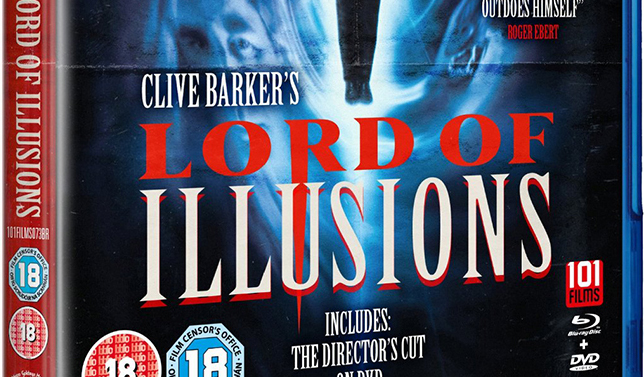
Lord of Illusions Blu-ray Review
 Until the rumoured, pant-wettingly anticipated ‘Hellraiser’ re-boot that I personally cannot wait for, the last directorial effort from the truly unique and warped mind of horror author Clive Barker was Lord of Illusions in (1995).
Until the rumoured, pant-wettingly anticipated ‘Hellraiser’ re-boot that I personally cannot wait for, the last directorial effort from the truly unique and warped mind of horror author Clive Barker was Lord of Illusions in (1995).
Based on his short ‘The Last Illusion’ from ‘Books of Blood VI – itself a veritable minefield of actual and potential horror franchises – the movie tells the story of private detective Harry D’Amour (Scott Bakula) and his investigation into the death of a prolific David Copperfield-esque illusionist named Philip Swann (Kevin J. O’Connor). Swann was a former and prized member of a cult led by a terrifying magician named Nix (Daniel von Bergen) and it was here that he learned his craft. At the insistence of Swann’s wife Dorothea (Famke Janssen of X-Men fame) D’Armour digs deeper into the shady world of magic performers and quickly discovers that there might be more to Swann’s hocus pocus than meets the eye.
We get a nice chunk of exposition at the beginning of the film that serves to introduce key characters and villains but this sequence has the unfortunate side effect of blowing any chance of suspense and revelation involving these elements later on. I wouldn’t want to spoil anything for any potential viewers but everything you suspect after watching those first 10 minutes or so will pretty much be the case so don’t expect the intrigue that the film’s tone promises. Speaking of intrigue (and nostalgia for some) there are some great supporting characters throughout such as Loomis played by Wayne Grace who would go on to appear in Kevin Costner’s Dances with Wolves in the same year, and David Lynch’s head-fuck ‘Mulholland Drive’ (2001) plus a personal favourite: Vincent Schiavelli who plays ‘Vinovich’, a wonderfully eccentric stage magician and ‘leader’ of a magic circle inspired clique of associates of Swann’s. Any X-Files fan will immediately recognise him. Another noteworthy performance is the film’s main antagonist; Nix played expertly by von Bargen. Nix is a grotesque individual, a real sociopathic megalomaniac with a chilling disregard for absolutely everyone; including his own disciples as exemplified during the film’s climax in which we see scores of these unfortunate bastards meet grizzly ends. This scene along with Swann’s ‘final stunt’ and the opening sequence benefit the most from the extended Directors cut featured on an additional DVD disc in box which ups the gore factor considerably.
Lord of Illusions pays homage to the classic noir detective genre with Bakula turning in a decent performance as the tough, brooding piss-head private detective. The character in the original short story goes on to appear in the full length novel ‘The Great and Secret Show’ – the first in a trilogy of novels known as ‘The Art Trilogy’ by fans so it’s possible that the D’Armour script and Bakula’s performance drew on this source material to further flesh out the character. However one of the problems with Bakula’s casting – as well as the Schiavelli for that matter – is the unshakable feeling that you’re watching a pilot television episode of some supernatural mystery. This televisual sensation is further compounded by the 1.85:1 aspect ratio employed by the picture – a fact that didn’t used to bother me so much until a certain fellow Filmwerk collaborator made me painfully aware of how un-cinematic this format appears on the small screen and therefore forever doomed my future enjoyment of films presented this way!
Alas, I digress.
Whether or not you rate Barker as a film maker independently of his writer’s prowess he certainly directs his own material with a greater degree of flare and stylization than others who have tried with his source material. Rawhead Rex, I’m looking at you! I’ve always enjoyed the music scores in Barker’s movies as they’re so wonderfully grandiose in contrast to the relatively tame production budgets so this goes some way to alleviate that dreaded televisual quality. Composer Simon Boswell really shines during Swann’s gruesome ‘final stunt’ scene with a dramatic and fittingly theatrical piece that makes good use of the percussion and brass section of the orchestras as well as a hefty dose of choir work no doubt inspired by Danny Elfman’s work on Barker’s previous film, Nightbreed (1990).
Whilst it may lack the fetishist brutality, iconic villain and box office success (although at the time of writing production budgets were not available so this may not be the case) of Hellraiser (1987) or the fantasy laden cult appeal of Nightbreed, Lord of Illusions still has a lot to offer horror/mystery fans, especially if you’re an advocate of Barker’s work. Nevertheless it is the weakest of his three movies.
Sean Kennedy
